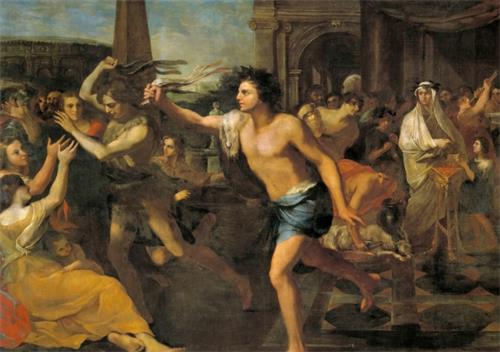
Many people are not clear that behind the Valentine's Day, which couples celebrate every year, there actually lies a touching love story.
The story takes place in the 3rd century during the Roman Empire, a time when love and freedom were not always accepted. Valentine, a devout monk, lived a simple life filled with ideals. It was this pure heart and fearless devotion to love that led him down an irreversible path.
One day, Valentine was imprisoned for defying an imperial decree that prohibited young men from marrying. The emperor believed that marriage made men less devoted to the empire. However, Valentine insisted that love should never be restricted, especially true love. Thus, he risked everything to secretly officiate weddings for lovers.
While in prison, Valentine encountered the jailer's daughter—a stunning young woman who had been blind from birth.Though she had never seen the world’s colors, she understood the essence of love. Valentine’s kindness and wisdom captivated her. One day, she asked him softly, “Sir, do you like flowers?”Valentine replied with a smile that she liked flowers, loved nature and loved everyone. His voice, warm and gentle, touched her heart deeply.
She sensed Valentine’s goodness and soon grew to admire him. Every evening, she would bring him a hearty meal, and gradually, they developed a deep and sincere connection. She confided in him about her struggles and sorrows, while Valentine listened attentively, sharing his insights about the world beyond the prison walls. With simple yet vivid words, he painted for her the beauty of nature—the golden sunrise, the lush green meadows, and the twinkling stars. Though she could not see them, she could feel their warmth through his descriptions.
As time passed, their emotions blossomed into a love that transcended the limits of sight and the barriers of society. Their affection was pure and profound, built on an unbreakable spiritual bond.
However, fate was not kind to them. The jailer discovered their relationship and furiously rebuked Valentine, believing he had overstepped his bounds. Yet, Valentine’s sincerity moved the old man. He confessed his love for the young woman and pleaded for their continued meetings. In the end, the jailer, touched by Valentine’s devotion, relented and allowed them to continue seeing each other.
Their love deepened with each passing day. Though imprisoned, Valentine’s heart burned with passion, and whenever he walked and talked with the young woman, he momentarily forgot his chains. In those moments, he was no longer a prisoner—he was simply a man in love.
Then, fate took a cruel turn. Valentine discovered a miraculous herb that could potentially cure the young woman’s blindness. Overjoyed, he began preparing herbal remedies daily, hoping to restore her sight. But before he could witness the results, his final judgment arrived—he was sentenced to execution.
Just as his life was nearing its end, a miracle happened. The young woman suddenly regained her sight. Though she had never known light, an overwhelming impulse drove her to rush to the execution site. Stumbling and breathless, she ran through the streets, calling out Valentine’s name with desperate hope.
Finally, she reached him. For the first time, she saw his face—the face that had long been etched in her heart. No words were needed; their gazes spoke of endless love and sorrow.
But time showed no mercy. Despite their love, fate would not halt its course. Valentine was executed, and the young woman, overcome with grief, succumbed to sorrow and passed away soon after.
Valentine’s death took him away, but his sacrifice for love was never forgotten. To honor this devoted martyr, the Church declared February 14th as "Valentine’s Day," a celebration of love and devotion that continues to this day.
This holiday symbolizes true, fearless love, and every year, couples exchange roses, chocolates, and heartfelt words in remembrance of the man who stood by love until the very end—Valentine.

Egypt’s Queen Cleopatra
Power and Desire: The Interwoven Fates of Egypt’s Queen Cleopatra
Cleopatra was the last Pharaoh of ancient Egypt, and her name has been forever linked to power, love, and choices.

Northern Ireland,Giant Syndrome
Decoding a Millennium-Old Mystery: The Genetic Mutation Behind Northern Ireland’s "Giant Syndrome"
In recent years, scientists have made groundbreaking genetic discoveries that unravel a millennium-old mystery—the occurrence of "giant syndrome" in Northern Ireland.

Ocean,Mercury Pollution
Is There Human-Caused Mercury Pollution in the World’s Deepest Ocean Trench?
Over 60 years ago, Japan’s Minamata disease scandal shocked the world, with methylmercury as the culprit. Mercury, a highly toxic pollutant, spreads through air and water, dispersing globally.


